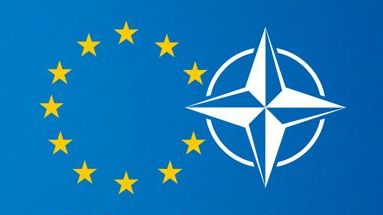
From Judy Dempsey, the New York Times: The reason for the deadlock is the divided island of Cyprus, whose northern part Turkey invaded in 1974 and has occupied since. This part of the island is recognized only by Turkey. And Turkey, a leading member of NATO and an E.U. applicant, does not recognize the (southern) Republic of Cyprus as a member of the E.U., which it joined in 2004.
Since 2004, when the E.U. reneged on its own principles not to admit Cyprus until the island’s status was resolved, the Cyprus-Turkey dispute has become one of the most debilitating and intractable issues inside and between NATO and the E.U., say diplomats from both organizations.
Turkey prevents high-level formal meetings between NATO and the P.S.C. [the E.U.’s Political and Security Committee] on the grounds that Cyprus does not have any security clearance from NATO. It is a member neither of the alliance nor of NATO’s Partnership for Peace, a program of bilateral and security cooperation between individual countries and NATO.
Because each NATO member has a veto, Turkey can stop discussions between NATO and the E.U. over military operations and intelligence issues. It can also stop Cyprus from sitting in on these meetings, even though Cyprus is a member of the E.U., and from participating in E.U. peacekeeping missions. …
Security analysts say the deadlock could be broken if the E.U. became more flexible toward Turkey, allowing it for instance to have a close relationship with the bloc’s European Defense Agency. The E.D.A., which was established in 2004 to coordinate the bloc’s defense capabilities and procurement, is not restricted to E.U. members. “We have an association agreement with NATO member Norway, which is not in the E.U.,” said Dick Zandee, head of the agency’s planning and policy unit.
When the E.D.A. proposed the same status for Turkey six years ago, it needed consent from all E.U. countries. Cyprus blocked it. Cyprus and other member states blocked it again when during a visit last month to Ankara, Mr. Rasmussen proposed that the E.U. allow Turkey to participate in the E.D.A.
“We are not obstructing anything,” said Andreas Theophanous, director of the Cyprus Center for European and International Affairs in Nicosia. “Turkey is blocking itself by not recognizing Cyprus as a member of the E.U.”
The retaliations seem endless, say diplomats. They are also damaging NATO as it seeks cooperation with the E.U., whose civilian components, like the police, the judiciary and customs officials, complement NATO’s military resources.
Image: eu%20nato%206%2021%2010%20pic.jpg
